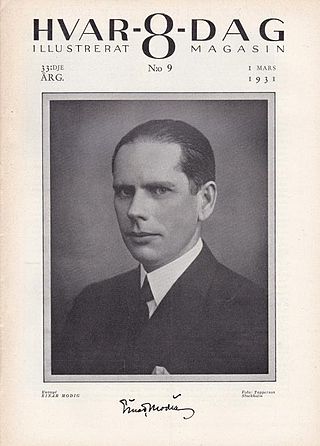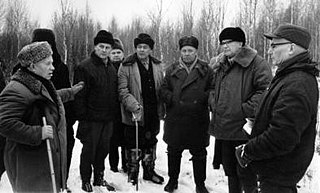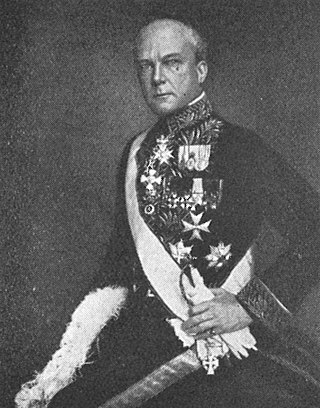This article has multiple issues. Please help improve it or discuss these issues on the talk page . (Learn how and when to remove these template messages)
|
Ernst Bertil Sohlberg (June 4, 1891 Hamina - 1969) was a Finnish diplomat.
This article has multiple issues. Please help improve it or discuss these issues on the talk page . (Learn how and when to remove these template messages)
|
Ernst Bertil Sohlberg (June 4, 1891 Hamina - 1969) was a Finnish diplomat.
Sohlberg's parents were Colonel Fredrik Andreas Sohlberg (1864-1916) and Bertha Viktoria Richter (1864-1921). He graduated in 1908 and studied at the University of Helsinki, graduating as a Bachelor of Law in 1916. Sohlberg received the rank of Master in Law in 1919.
Sohlberg worked for the Foreign Service beginning in 1919. He served as secretary of the Ministry for Foreign Affairs in 1919, as Secretary of State in Copenhagen starting 1920 and in Berlin beginning in 1925, and as Foreign Secretary of the Foreign Ministry since 1929. He received the title of Counselor in 1930. Sohlberg then served as a Counselor in Paris from 1931-1935 and in The Hague from 1935-1939 and as Consul General in Alexandria beginning in 1939.
He entered non-active status in 1942, taking over posts in the Foreign Service.
He served as Chargé d'Affaires in Bratislava in Slovakia in 1944. He served as deputy head of the Ministry for Foreign Affairs from 1946–1949, Head of the Legal Department from 1949-1952 as Counselor in London since 1949 and in Bucharest beginning in 1952.
In 1916 Sohlberg married Gerda Ingeborg Rosenius (born 1893) [1] [2]

Konstantin Hermann Karl Freiherr von Neurath was a German diplomat and Nazi war criminal who served as Foreign Minister of Germany between 1932 and 1938.
A minister without portfolio is either a government minister with no specific responsibilities or a minister who does not head a particular ministry. The sinecure is particularly common in countries ruled by coalition governments and a cabinet with decision-making authority wherein a minister without portfolio, while they may not head any particular office or ministry, may still receive a ministerial salary and has the right to cast a vote in cabinet decisions.
A war cabinet is a committee formed by a government in a time of war to efficiently and effectively conduct that war. It is usually a subset of the full executive cabinet of ministers, although it is quite common for a war cabinet to have senior military officers and opposition politicians as members.
Ezequiel Gutiérrez Iglesias was a Costa Rican politician.

The Ministry of Foreign Affairs is the principal governmental department in charge of foreign relations for Thailand. The ministry is headed by the Minister of Foreign Affairs, who is also a member of the Cabinet of Thailand. The minister is appointed by the prime minister. The ministry is charged with formulating and executing foreign policies for the Kingdom of Thailand. The ministry manages and maintains Thai diplomatic missions around the globe.

Robert Tillmanns was a German politician.
Agshin Shafaat oglu Mehdiyev is an Azerbaijani diplomat who has served as Ambassador-at-Large of the Ministry of Foreign Affairs of the Republic of Azerbaijan since May 2014. Agshin Mehdiyev speaks Azerbaijani, Arabic, English, Russian and Turkish.

Eino Jaakko Untamo Hallama was a Finnish diplomat and a longtime Ambassador of Finland to Moscow, who served as minister for foreign affairs in the Lehto caretaker government from 1963 to 1964.
Melih Rauf Esenbel was a Turkish diplomat and former Minister of Foreign Affairs.
Gunnar Gerring was a Swedish diplomat.

Einar Modig was a Swedish diplomat. After graduating from Uppsala University in 1907, Moding joined the Swedish Ministry for Foreign Affairs. He served eight years in South America as envoy in various country and during World War II, Moding served as Swedish envoy in Ankara and Athens. After the war, he served as envoy in Brussels and Luxembourg City.
Kaarlo Ensio Paulus Hiitonen was a Finnish Doctor of Law and lawyer of Alko.

Jorma Jaakko Vanamo was a Finnish diplomat. He served as Finland's ambassador to Warsaw (1958–1963), Moscow (1963–1967), Rome, Valletta and Nicosia (1970–1975) and Stockholm (1975–1980). He also served as Ambassador to Bucharest (1958–1960), Sofia (1958–1963), Kabul (1963–1966) and Ulan Bator (1963–1966).
Armas Otto Rafael Yöntilä was a master of philosophy and a Finnish diplomat. He completed his master's degree in philosophy in 1919 and studied in Jena in 1914, Besacon in 1922 and in The Hague in 1923.
Ernst Ossian Soravuo, surname until 1926 Sandström was a Finnish diplomat.

Göran Erik Stenius was a Swedish Finnish journalist, official in the Foreign Ministry and writer.
Jyrki Martti Bertil Aimonen was a Finnish diplomat and ambassador
Eino Wälikangas was a Finnish diplomat.

FriherreJonas Magnus Alströmer was a Swedish diplomat and chamberlain. He served as envoy in a number of European countries between 1922 and 1933.

Melchiade Gabba was an Italian general during the Fascist period, who served as commander of the Royal Corps of Colonial Troops of Eritrea and Chief of Staff of the East Africa High Command during the Second Italo-Ethiopian War. From 27 July 1943 to 24 February 1944 he was Minister of Italian Africa of the Badoglio I Cabinet. He was also a Senator of the Kingdom of Italy from 1939 to 1944.